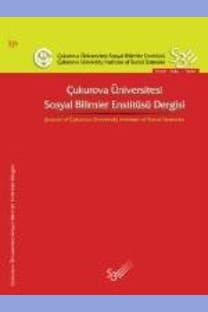Muhasebe Öğretim Elemanlarının Bilgi Teknolojisinden Yararlanma Oranlarının Tespitine ilişkin Bir Araştırma
İşletmeler teknolojinin hızla geliştiği rekabetin arttığı bir ortamda faaliyette bulunmaktadırlar Bilgi teknolojisi araçlarını en etkin ve verimli şekilde kullanan kişi ve işletmeler rekabet üstünlüğüne sahip olmaktadırlar Öğretim elemanlarımızın bilgi teknolojisi araçlarını muhasebe derslerinde eğitimin verimliliğinin artırılması yönünde kullanmaları öğrencileri yeni iş ortamına hazırlayacaktır Bu çalışmada öğretim elemanlarının bilgi teknolojisi araçlarını kullanım amaçları ile muhasebe derslerinde kullanım oranları ve sıklığı tespite çalışılmıştır Anahtar Kelimeler: muhasebe eğitimi bilgi teknolojisi öğretim elemanı
Anahtar Kelimeler:
muhasebe eğitimi, bilgi teknolojisi, öğretim elemanı
Muhasebe Öğretim Elemanlarının Bilgi Teknolojisinden Yararlanma Oranlarının Tespitine ilişkin Bir Araştırma
Companies do business in an environment in which competition and technological development increase fast Companies and people who use information technology tools effectivelly and efficiently will have competitive advantage Students can be prepared to new business environment with the usage of information technology tools to increase the effectiveness in accounting courses In this study It is tried to determine the educators’ aim in the usage of information technology tools and its usage level and frequency Key words: accounting education information technology lecturer
___
- Ahadiat, Nas, Application Of Technology in Accounting Education and Analysis of Its Use Among Faculty, 2003 (www.csupomona.edu/jis/2003/Ahadiat.pdf)
- Albrecht, Steve, Robert J. Sack, Accounting Education: Charting the Course Through a Perilous Future,' Accounting Education Series, Vol.16, http://aaahq.org/pubs/AESvl6/toc.htm
- Bromson, Garry, Mary A. Kaidonis ve Paul Poh, Accounting Information Systems and Learning Theory: an Integrated Approach to Teaching, Accounting Education, Vol. 3, No 2,1994
- Byrne, Marann, Barbara Flood, Defining The Present and Shaping The Future: The Changing Nature of Accounting Education in Ireland, Journal of Acconting Education, 21, 2003
- Çürük, Turgut ve Zeki, Doğan, Üniversitelerde Muhasebe Eğitimi ve İşletmelerin Taleplerini Karşılama Düzeyi, 2002
- David, J.Smith, Harriet Maccracken ve Philip M.J.Reckers, Integrating Technology and Business Process Analysis into Introductory Accounting Courses, Issues in Accounting Education, Vol. 18, No. 4, November 2003
- Frederickson, James R , Jamie Pratt, A model of the accounting education process, Issues in Accounting Education. Sarasota: Fall 1995.Vol. 10, Iss. 2
- Kaya, Ergün, A.Aziz Karagül, İnternetle Muhasebe Eğitimi, XX. Muhasebe Eğitimi Sempozyumu, 23-27 Mayıs, 2001, Antalya
- Russell, A. K., Carl S. Smith, It's Time for a New Curriculum, Strategic Finance,December 2003
- Stout, David E., Joseph J. DaCrema, A Writting intervention for the Accounting Classroom: Dealing With The Problem of Faulty Modifiers, Journal of Accounting Education,Vol 22,2004
- Tennent, B., Karen Windeknecht ve Jo Kehoe, Teaching With Technology: value-added innovation or necessity?, Campus-Wide Information Systems, Vol 21, No 4, 2004
- Williams, C.Bernard, Computers BITE Accounting Education, Accounting Education, 4, 1992 (http://web26.epnet.com/bite.pdf)
- 1 http://www.aicpa.org/pubs/jofa/apr2002/gabbin.htm
- 2 http://www.isov.org.tr/html/eda2000.doc 24.10.05
- 3 http://aaahq.org/AECC/Positionsandlssues/pos2.htm
- 4 http://www.swleaming.com/accounting/jacl3_article2.html
- 5 http://www.ifac.org/Members/DownLoads/IES.Introduction.pdf
- 6 http://www.acca.co.uk/research/summaries/903898
- 7 http://www.isletme.istanbul.edu.tr/tmes2004/bildiriler.htm
- ISSN: 1304-8880
- Yayın Aralığı: Yılda 2 Sayı
- Başlangıç: 2013
- Yayıncı: Çukurova Üniversitesi Sosyal Bilimler Enstitüsü Dergisi
Sayıdaki Diğer Makaleler
Yrd. Doç. Dr. Zeynep HATUNOĞLU
ÇOCUK EĞİTİMİNDE MONTESSORİ YAKLAŞIMI
Bil. Uzm. Vuslat OĞUZ, Doç. Dr. Aysel Köksal AKYOL
Dr. Fatih YÜCEL, Arş. Gör. Ahmet Yılmaz ATA
Enflasyon Hedeflemesinde Beklentilerin Önemi: Türkiye Ekonomisi için Ampirik Bir Çalışma
Arş. Gör. Ali ACARAVCI, Arş. Gör. Cuma BOZKURT
Alımlama Estetiği Açısından Çeviri
Edebiyatçıların Arkası Şiirli Armağan Fotoğrafları
Eu Citizenship As A Common Identity: Theoretical Underpinnings And Main Dimensions
Heavy Metals Leaching from, Low Temperature Glazed Turkish Traditional Ceramic Wares
Hunay EVLİYA, Yusuf Ziya HALEFOĞLU, Nesrin KILIÇ
Assist. Prof. Dr.tülin URAL, Assoc. Prof. Dr. Mehmet ÖZBİRECİKLİ
